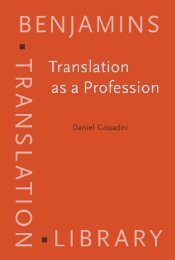Constructing a Sociology of Translation.pdf
Constructing a Sociology of Translation.pdf
Constructing a Sociology of Translation.pdf
- No tags were found...
Create successful ePaper yourself
Turn your PDF publications into a flip-book with our unique Google optimized e-Paper software.
Erich Prunčstory about the famous translator Hunain ibn Ishaq who was paid an amount ingold equal to the weight <strong>of</strong> his translations from Greek into Arabic (cf. Delisle andWoodsworth 1995 :113f.).If transcultural communication is the exclusive remit <strong>of</strong> the political, economic,cultural and military elites who want their interests guarded, then the differentiation<strong>of</strong> translational activities closely follows the inclinations <strong>of</strong> these elites. Ifthey have the linguistic skills to cope with all types <strong>of</strong> transcultural communicationthen they will not need translation. If there are enough bilingual speakers orif the members <strong>of</strong> the elite can rely on an international lingua franca, like Latinin the Middle Ages or French as the language <strong>of</strong> diplomacy, then translators willonly be active in those areas that have little symbolic capital, i.e. in those domainswhere members <strong>of</strong> the elite had to communicate with the “common people”. Forexample, the conquerors with the conquered, the colonial masters with the colonised,the generals with the soldiers. In these contexts, translators are typicallyslaves and prisoners <strong>of</strong> war or lowly scribes and subaltern <strong>of</strong>ficials in the service<strong>of</strong> feudal lords and colonial masters.This typical correlation between translation activities and the bilingual potential<strong>of</strong> a society and its elites can be overturned by ideological factors. As the non-German speaking peoples as the Slovenes and the Croats in the Austro-HungarianEmpire developed their national ideologies, at first the more prestigious literarygenres were not translated into the national languages. Publishers, authors andliterary critics agreed that the “world literature” did not need to be translated intothe national languages because bilingual middle-class citizens could easily readthe texts in German. For the process <strong>of</strong> national integration it was necessary, however,to include the predominantly monolingual rural population in the nationbuildingprocess by supporting organisational measures such as, for instance, theestablishment <strong>of</strong> reading circles to provide these groups with literature in theirnational languages. The texts, which were translated into the national languages,did not qualify as “serious literature” but included, above all, religious texts, practicalinstructions for farming and cattle breeding, and simple narrative genres.This situation did not change until the late nineteenth century when the pr<strong>of</strong>ile <strong>of</strong>genres was gradually expanded, and more complex and demanding literary textswere translated (cf. Hladnik 1993; Prunč 2005). In this process the first literarygenre that were translated were plays. Here the focus was on the representativefunction <strong>of</strong> language, not on the bi- or multilingual competence <strong>of</strong> the audienceand the aim was to provide translated scripts to help develop theatre as a nationalinstitution.This last example highlights the correlation between the amount <strong>of</strong> translationand the degree <strong>of</strong> democracy and literacy in a society. As transcultural processesare becoming increasingly democratic and globalised, not only the demand
















